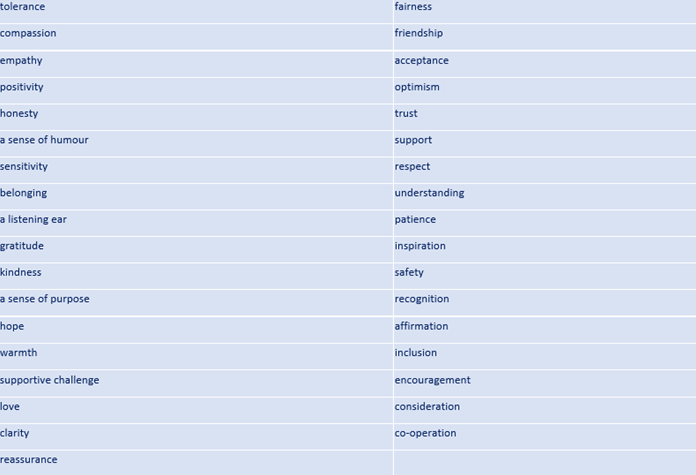Posted 1 year ago
Thu 27 Jun, 2024 12:06 PM
Going to University is a major transition that can make you feel nervous, overwhelmed, excited and full of anticipation all at once. It may be the first time you, and your flatmates, have ever had to live away from home, and with a group of strangers!
Whilst learning to understand and adapt to each other's living habits, it can be expected that some misunderstandings, conflicts, or disagreements may arise throughout your year together.
Below are some suggestions of how to effectively communicate with your flatmates to prevent conflict and harm, and how to work together to create and maintain a harmonious living space.
Identifying Needs
It is often the case that our feelings and actions are a result of fundamental needs either being, or not being, met by those around us.
Take a look at the needs list below; think about some of the key needs that yourself, and your fellow students, may have during their first few weeks at University.

Whilst these may differ from person to person, it is important to be empathetic and put yourself in each other's shoes. In order to live harmoniously with your flatmates, consider what they might be feeling at that moment in time and how this may affect their behaviour.
e.g. You may have a flatmate who is not attending social events and has started to distance themselves in the flat. You have invited them out with you but they keep declining which you have found rude. You have found living together is becoming difficult as they leave the room when you're socialising in the kitchen.
Consider what their needs may be. Their behaviour may be due to their unmet needs of patience, understanding and support. Perhaps they are nervous around new people and need some more time to adjust to living away from home; or maybe they don't enjoy the same activities as you so have started to distance themselves.
Look for a solution as a flat as to how you could include them at a pace that suits them and find activities you will all enjoy.
Communication is key - it can be helpful to look through this list of needs and discuss them with your flatmates. Perhaps you can decide on a few shared needs that you can strive to meet throughout your time living together by finding practical solutions.
Helpful Conversation Structures
If you're upset or angry with someone, or have been affected by a situation, it's easy to jump to using "you" statements when communicating.
For example, "you used my plates yesterday and left the kitchen in a mess", or "you were so noisy when you got in last night, I barely got any sleep".
These statements are accusatory and can evoke feelings of hostility and defensiveness from the person receiving them. By pointing out what they have done wrong, they may feel as though you are trying to make them feel bad, guilty, or as though you want them to change. This is not constructive for building relationships!
By using "I" statements, you are instead focusing the conversation on your feelings, actions and needs. This communication strategy allows you to let the other person know exactly how you are feeling, and focuses on the issue at hand. People may be unaware of how their actions are affecting you and may underestimate how upset, hurt or angry you may be.
Use the following "I" statements to help structure your conversation:
- When I see/hear...
- I think to myself...
- And I feel...
- What I need is...
- Would you be willing to...
For example:
- "When I see that my plates have been used and haven't been cleaned up, I think to myself that someone has used my things without asking me first and that makes me feel a bit upset. What I need is some respect for my belongings. Would you be willing to wash my things and put them back if you use them?"
- "When I hear noises coming from the kitchen late at night, I think to myself that I've got an early lecture in the morning so I really need to sleep. This makes me feel quite stressed. What I need is some consideration for my feelings and understanding that it's late at night. Would you be willing to set some quiet hours for the flat?"
The restorative approach is focused on building, maintaining and repairing relationships. By using "I" statements, you are identifying your needs (from the list above) and focusing on solutions rather than problems. This is a great way to prevent conflict in the future and help improve understanding between you and your flatmates.
If you are still finding that your living situation is impacting on your wellbeing, you can access resources and support on the intranet. If you are unsure who to contact or what support you need, contact Student Connect and they will direct you to the correct team. If you require support for violence or abuse, you can contact the the Student Support Intervention Team directly here.






